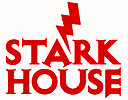“The Vengeance Man is his second best book, behind only The Name of the Game is Death. The corruption of virtually every important character in the book is thorough.” – Charles Kelly, from his introduction
“Marlowe’s narrative and linguistic style still have their appeal today thanks to his laconic and non-compromising attitude. His tones still grate on our ears or hit us in the gut.” –Josef Hoffman, “Playing With Fire”
Dan J. Marlowe was born in Lowell, Massachusetts, in 1914, the son of a printing press mechanic. He received an accounting certificate from Bentley School of Accounting and Finance in Boston in 1934, and lived alternately as a professional gambler and an office manager until 1956, when, after the death of his wife, he decided to try his hand at writing. By the end of 1958 he had sold his first two books, featuring detective Johnny Killain. In 1962, Marlowe produced his masterpiece, The Name of the Game is Death, which so impressed a real bank robber, Al Nussbaum, that the two of them started corresponding and eventually became friends and collaborators. At the height of Marlowe's career, having already won the 1971 Edgar Allan Poe Award for Best Paperback Original, he suffered an attack of amnesia. Moving to Los Angeles with Nussbaum, he tried to regain his writing skills. He passed away of heart failure in Tarzana, Calif., in August of 1986.

$19.95
- The Name of the Game is Death / One Endless Hour
- 978-1-933586-44-1
- Considered to be Marlowe's masterworks, here are two hardboiled thrillers featuring Earl Drake, hardened thief on a mission of vengeance. Charles Kelly, author of a new biography on Marlowe called Gunshots in Another Room: The Forgotten Life of Dan J. Marlowe, contributes the introduction, and Gary Brandner provides a personal afterword.
-
-


- The Vengeance Man / Park Avenue Tramp / The Prettiest Girl I Ever Killed: A Trio of Gold Medals
- 1-933586-14-1
- Three distinctive thrillers from the golden era of the paperbacks, all originally published by Gold Medal Books in the late 1950’s and mid-1960’s. New introductions by Charles Kelly and Ed Gorman. OUT OF PRINT
-
-


